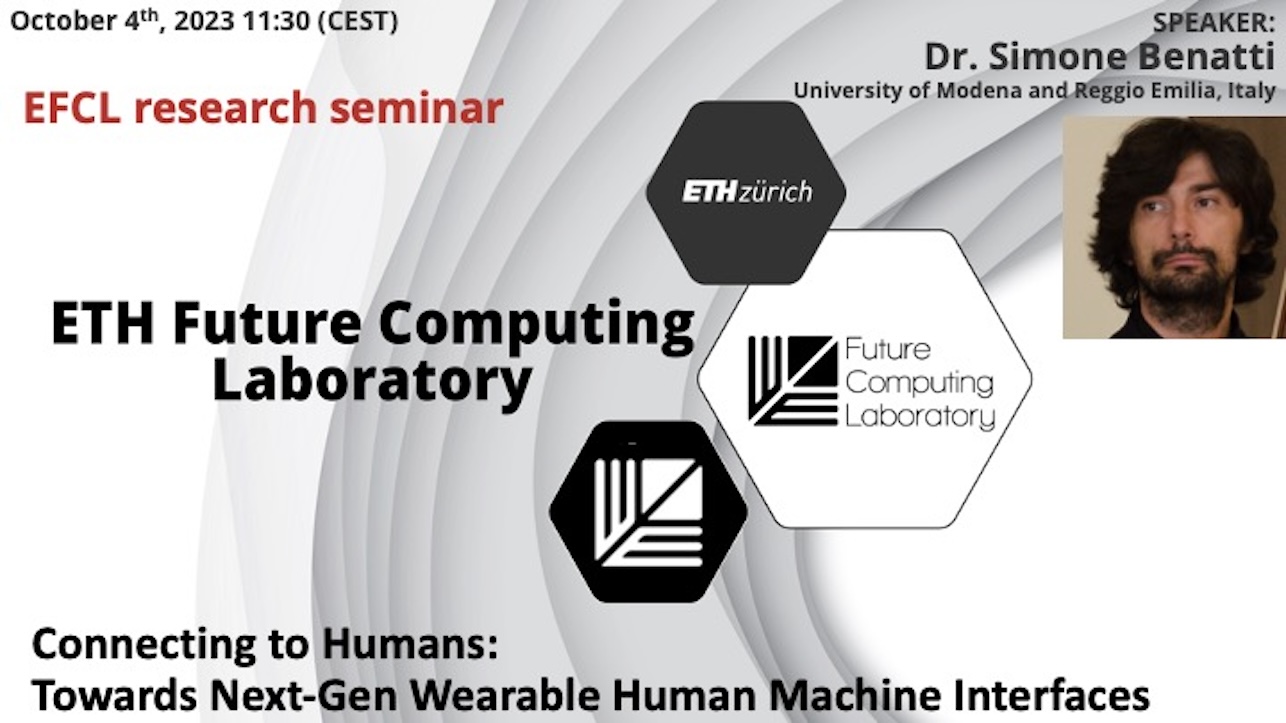Connecting to Humans: Towards Next-Gen Wearable Human Machine Interfaces

Join us for our upcoming Future Computing Seminar Series
Speaker: external page Dr. Simone Benatti, Università degli studi di Modena e Reggio Emilia
Date: October 4th, 2023, 11:30 CET
Where: Online & ETZ E7
Abstract:
In the ever-evolving landscape of biopotential processing, the pursuit of seamless human-machine interaction has taken center stage. In wearable gesture recognition, electromyography (EMG) has emerged as the prevailing paradigm. Its widespread use in practical applications to enhance natural control of human-computer interaction is pivotal in bridging the gap between humans and technology.
Recent developments in the machine learning domain and the increasing efficiency of low-power digital platforms are driving the first wave of devices that utilize pattern recognition based on EMG in wearables to recognize gestures. These innovations represent a significant leap forward in the fusion of human movement and technology. While these approaches effectively recognize gestures, they fail to provide a complete neural understanding of the gesture's intention since ML often functions as a "black box," providing results based on the undecipherable superposition of motor unit activations, without offering significant insight into the neural intent behind gestures. Recent research endeavors have shifted the spotlight toward the neural aspect of EMG signals, transitioning from merely capturing muscular activation to decoding the motor unit action potentials (MUAP), leveraging Blind Source Separation (BSS). BSS deconstructs EMG signals into fundamental sources, effectively "unmixing" the MUAP. This paradigm shift has profound implications, transforming EMG analysis from a 'black box' approach to a more transparent and intuitive understanding of how gestures or force levels can be decoded.
In the same field, but from a different perspective, ultrasound technology is becoming a game-changer in human-computer interaction. Once primarily associated with medical imaging, this technology offers real-time, non-invasive insights into the subtle nuances of hand and body gestures, enabling devices to 'see' and interpret human gestures accurately, using the physical analysis of the shape and depth of muscular movements.
This presentation explores the combination of these two approaches for developing next/generation wearable gesture recognition devices. We give an overview of the emerging field of Blind Source Separation (BSS), which is pivotal in unveiling the neural information inside the EMG signals. Furthermore, we will present the preliminary analysis of US-based gesture recognition. Finally, I would like to suggest what will be possible by integrating EMG and ultrasound in gesture recognition to discover what the future holds in this exciting evolution of human-machine interaction.
Speaker Bio:
Dr. Simone Benatti received a PhD. degree in Electronics, Telecommunications and Information Technologies from the University of Bologna, under the supervision of prof. Luca Benini. During the PhD, he spent several months as visiting fellow at BWRC - University of California, Berkeley (supervisor prof. Jan Rabaey). Currently, he serves as Assistant Professor at University of Modena e Reggio Emilia, while pursuing his collaboration with EEES lab in Bologna. In 2023 he has been appointed as Visiting Professor at EFCL-ETHZ
His research interests focus on energy-efficient embedded systems for IoT and biomedical applications. This includes hardware/software codesign to efficiently address performance, as well as advanced algorithms. Dr. Benatti works on designing and optimizing energy-efficient embedded systems for biopotential (EMG and EEG) acquisition and processing, and on Brain-Machine Interface for HMI. In this field, he has published more than 90 papers in international peer- reviewed conferences and journals, with more than 2200 citations and an H-index of 24 [Google Scholar]. He has ongoing collaborations with several international research institutes, such as ETHZ-EFCL, EPFL, TU Graz, FBK and Politecnico di Torino. Dr. Benatti is recipient of the GHAIA grant (H2020-MSCA-RISE-2017, G.A. 777822).